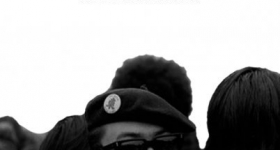Though I thought "When the Levees Broke" was great -- and I believe it's something that everyone should watch -- I don't recall Lee interviewing one Asian American. As if the whole Katrina/Rita/Gulf Coast thing was only a black and white thing. There was no mention of Latinos or American Indians either. We know for a fact that Vietnamese, Cambodian and Lao communities were affected by Katrina and Rita. Totally left out. At the same time, I'm not surprised. Lee is very Afrocentric and that's what he does well. But in terms of historical accuracy and representation, it was lacking a bit.
Another point that several commenters on other blogs have pointed out is that we know Yuri Kochiyama was the one who held Malcolm X in her lap after he was shot. There was no representation of that in Spike Lee's version, though that moment was recorded by a photographer for Life magazine in 1965. There was a brief shot of an Asian American sometime before that scene in Lee's film, presumably a nod to Kochiyama. But why not be completely accurate then?
In terms of Eastwood, Lee is probably right that he could've done more to honor African American soldiers during WWII. Everyone knows what a huge watershed moment the war was for everyone, really. But African Americans fought on the frontlines in a segregated military -- while there was still lynchings and segregation going on at home. (On a similar note, Japanese Americans fought on the frontlines while their families were incarcerated behind barbed wire in "camps"). Lee, by the way, is making his own WWII film about the African American 92nd Buffalo Division.
I'm not even going to go into the privilege factor, that Eastwood being a white actor and director probably has an easier time in Hollywood. Lee, being an African American director who writes and directs Afrocentric films, probably doesn't get a lot of love all the time. Plus, I think Lee deserved an Oscar for at least one of his films, but hasn't received one.
They're both great directors. But both are lacking when it comes to racial representation. I read somewhere recently that journalists -- and I would extend it to filmmakers as well -- write the first draft of history. If you're not in that draft, you're invisible.










Comments